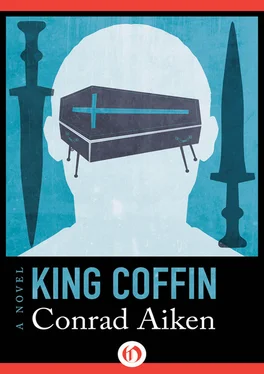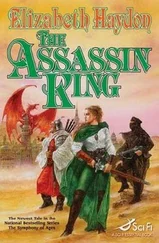— Capri?
— It was all right. I could hit a stone the size of a watch at fifty feet.… I’ll use that rock over there.
He placed the box of cartridges on the grass before her, the revolver on top of it, then walked deliberately across the hollow toward the large rock at the farther end, where it rose against the overhanging hillock of other rocks and cedars. As he went, he stooped, picking dandelions, choosing the larger ones, and these he hung over the lichened crest of the gray rock, their golden heads toward Gerta. The sun came out, accentuating their brightness and the paleness of his hands. Turning back, he counted off the paces.
— Twenty-five.
— I suppose you’d like me to hold one in my teeth?
— This is probably the first time in the world that dandelions have been used. Now cover your ears.
He smiled at her: she smiled back. Then, raising the little black pistol over his head and slowly lowering it to the level of the rock, and without perceptible pause, the first golden disk sighted, he fired. The rock seemed to have jumped, the first of the dandelion heads had vanished, the swift sound fled wildly off among the woods, the little smoke died in sunlight. Before the ringing in his ears had ceased he fired again, and again the rock jumped, but this time it was a miss; then again, again, again, and again. Four of the flowers were gone, the woods were singing with compressed clamor, one clap of sound folding hollowly on another, a muffled swoon of tumult. He clicked the empty revolver, lifted his face to the smell of drifting gunpowder, laid his hand over the short barrel to feel the warmth. When he turned round, he saw that Gerta had gone very white.
— Feel it, he said.
— No thank you. I’m not enjoying this.
— I’m sorry. Do you mind if I continue?
— Not at all.
— If you listened carefully, it might give you a sense of power!
— A sense of your power?
— Just as you like.
She was frightened, she sat down again on her rock, her lips tightly pressed together, her face averted: she was swinging one foot, nervously; perhaps angrily. What she was about to say was in her eyes, in her lowered brows: he watched her decision while he extracted the magazine of blue metal and reloaded it.
— If you don’t mind my saying so, it all seems to me extremely silly.
— Why should I mind what you say? It is silly. Like many necessary things. And like many things we’ve agreed on before. Sandbach, for instance!
He gave a laugh, she turned and looked at him with a sudden sharpening of expression, something very like hatred, then as quickly looked away again. As if deliberately to pay no attention to her meaning he clicked the magazine into the grip, drew back the barrel, raised the pistol once more, lowered it, and fired. Another dandelion leapt in air and vanished, the bullet, ricocheting, whined away to the left, the hum of it lost in the swift sound of tearing which screeched in a circle round the woods; and then the five other shots, which followed in quick succession, doubled and redoubled the confused clamor. Only one dandelion was left, the echoes repeated ee yah, ee yah, ee yah , diminuendo, wingbeat on remoter wingbeat, a sullen dying of applause, and everything was again silent. He looked down at the empty shells, scattered about his feet, and said:
— Sandbach, for instance.… Ten out of twelve, not so bad.
She had stooped forward, had picked a single grass blade, was examining it, turning it between her fingers.
— And now would you mind telling me what it’s all about?
— I said Sandbach.
— Sandbach was understood, wasn’t he?
— It’s an accomplished fact, then?
— If you don’t mind, Jasper, I’d prefer not to discuss that part of it. You see—
— I see. I foresaw ! I even foresaw that with it would go this withdrawal. And of course that he would say to you that you must drop me. But it’s too late. You can’t. You’re here.
— Yes, I’m here, but I think I must tell you—
— I think I’d better tell you .
— My dear Jasper, I wish you would! If it’s not too late. I mean, if that part of it isn’t too late. I can’t go on with it — I won’t any longer have any responsibility — much as I love you — can’t you see that the whole thing was a sort of hallucination? Couldn’t we still make something much better of it? S means nothing, not a thing—
She had put the grass blade between her lips, was looking downward, tears had brightened her eyes. But her voice had remained as admirably level as always.
— What is it exactly that you’d like to know?
— I want to know what it’s all about.
— We had that out. I haven’t changed.
— Could you tell me about it?
— My dear Gerta, you’re like an open book!
He laughed again, looking down at her tightly clasped hands, and went on:
— Well, I’ll say this much, that if he isn’t perfect he’s at any rate very good!
— Sandbach?
Her expression of bewilderment might or might not be ingenuous.
— No. We’ll call him X, shall we? It’s not Kazis. Would you like to know his real name?
— No.
— It’s Jones. The ideal name, and almost the ideal person. Good God, I didn’t know such people existed! A real and complete nonentity. Lives in a two-family house, takes out his own ashes, wears rubbers on rainy days, rides on a streetcar every day of his life.
— I see. And that’s enough, is it?
— Of course. Not that it’s enough to know . It’s curious how interesting it has become to know about him, to learn about him — and I’ve learnt a lot. Would you like to hear some of it? He reads The Herald , uses toothpicks, wears brown shoes with a blue suit, drinks a pint of whisky everyday at his office. I suppose he has nothing better to do. He’s in the advertising business, has a business, so-called, of his own. Reads textbooks on advertising in the subway. Yesterday it was a Manual of Typographical Standards published by The New York Times . Mezzographs, Line Cuts, Half-Tones, and Ross Boards — I’ve been studying it myself.…
— You are insane.
— Are we?
— Do you know S wants to report you?
— Oh, he does, does he!
— Yes.
He picked up the red-covered box of cartridges from the grass, put it in his pocket, took out his pipe; and as he did so a cloud went softly over the sun, the scene darkened. Everything looked smaller and nearer, Gerta seemed shrunken, he suddenly had a strange feeling of loneliness. This had happened before — it had happened only this morning in Harvard Square, when the sight of so many people, all rushing towards the subway, had given him a queer and unmistakable sensation of panic, of which the essential was solitude. This had been quite recognizable, was recognizable now, but had it any real significance? Yes, they all wanted to kill him, everybody really wanted to kill every one else, to be immersed in a crowd was to be immersed in a world of enemies. To face another individual was to face an enemy, even to face Gerta, who, under his own guidance, was in the very act of escaping from beneath his control. The eyes with which she looked up at him were Sandbach’s eyes, the words she used were now Sandbach’s, Sandbach had possessed her, still possessed her, it was to Sandbach he was speaking.
— I see. It is really Sandbach I am now talking to.
— Jasper, my dear, won’t you sit down and discuss it calmly?
— Yes. Let’s talk about it, for the last time, calmly!
He stretched himself, lazily, full length, on the grass, his hands under his chin: at once she came and sat beside him, crossing her knees: it was her intention to encroach. Leaning forward, and looking at him earnestly, she said:
Читать дальше












